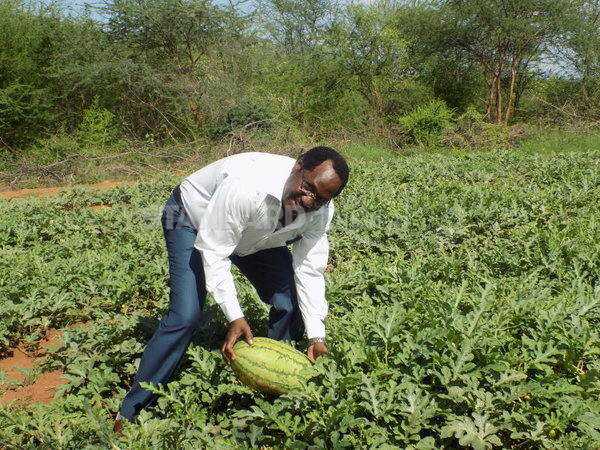BY JOSEPH MUCHIRI / THE STANDARD
Dr. John Kanya has been a watermelons farmer since 1996.
“I started planting water melons in 1996 with the excitement of a newbie. But along the way, I encountered thorns. I harvested all these tonnes of melons then there was no market. It was so frustrating I quit.”
He says he had grown the best melons in the land, yet there were no buyers.
“I harvested 20 tonnes from one acre but it all went to waste. I could not find buyers and the one who turned up was offering just Sh5 per kilo. This could not even meet the cost of production. I let villagers take as many as they could while the rest rotted in the farm,” he says.
After that experience, he went back to academia and buried his head in research until last year when he started farming afresh with renewed vigour.
Soil testing
He had visited a friend and was impressive how he was doing well with horticulture farming. That prompted him to revive his dream.
To avoid making mistakes, he decided to do things the right way. He conducted soil testing and found out that water melons and tomatoes can thrive in his ecological zone.
To roll out, he put two acres under tomatoes last year and they did so well. He made Sh1.5 million in profits in just four months.
“Second time round, I was a master of sorts. I researched on good husbandry and the market component.
So when the crops were ready, I had somewhere to take them. That was especially critical given that tomatoes are perishable crops,” Dr Kanya says.
So what are his secrets to successful horticultural farming?
First, he says, is a reliable farm manager.
“Given that you cannot be on the farm 24/7, you need a hardworking and reliable hand, otherwise it will be a disaster. My farm manager Jackson Nyaga, is so committed and professional, he gives me peace of mind.”
He adds: “Most times I give only strategic and technical advice. My manager keeps me abreast of the goings on at the farm during my absence.
He sends me photos of crops at nurseries, those being transplanted and the growing ones. That way, I am able to concentrate on my duties at the university as I also farm.”
Equally critical for profitable farming is, embracing technology which helps to cut on labour costs.
Diversification
Diversification also matters, he says.
“As a smart farmer, you cannot put all your eggs in one basket, that is why I invested in watermelons. In case tomatoes fail, I can bank on my melons,” he advises.
In January, this year, he planted watermelons on four acres and the good news is that they started maturing. He expects them to do fairly well.
However, cultivating big and blossoming melons does not come cheap.
He used 2kgs of hybrid seeds which cost Sh36,000. Moreover, he applied manure, planting and top dressing fertilisers.
The crop was sprayed with fungicides and pesticides to keep diseases and pests, such as melon flies, at bay.
“The melons were affected by serious shortage of water for a week after River Ena dried up.
“If this had persisted for another week, we would have lost the entire crop,” he says.
The onset of the rains was God-sent as the watermelons revived. He expects an acre of water melons to yield at least 15 tonnes, which he sells at between Sh20 and Sh40 per kilogramme.
Timing is everything for successful farming, he notes.
Six weeks ago, he planted tomatoes on two and half acres and put two more acres under tomatoes shortly thereafter.
“I expect to start harvesting the older tomatoes mid this month. I have started planting tomatoes so I can have a crop to harvest every month.
Maximise yields
“This is crucial as it helps me maximise my earnings since market gluts occur only a few times in a year,” he says.
He prefers the hybrid Rambo variety which does well in the area.
He plants them in seedbeds which eases transplanting.
Kanya describes agribusiness as a lucrative enterprise if one goes into it after proper researching, planning and having adequate capital.
He says from a farming investment not exceeding Sh1 million, a farmer can make a profit of Sh1 million in just four months unlike in rental houses where one takes several years to recover his costs








